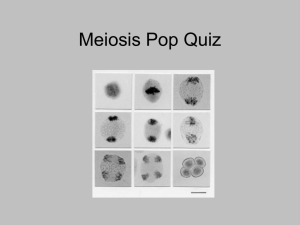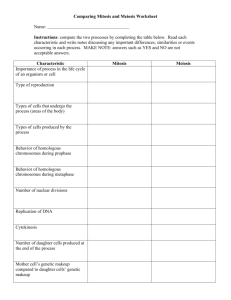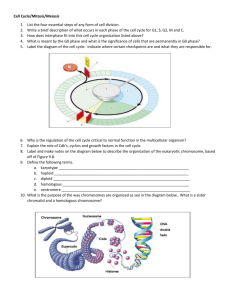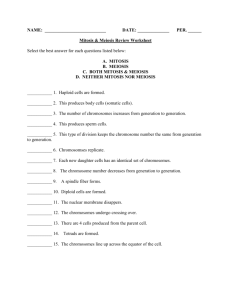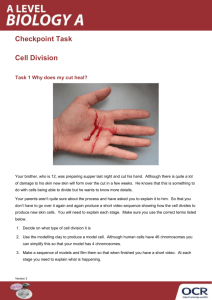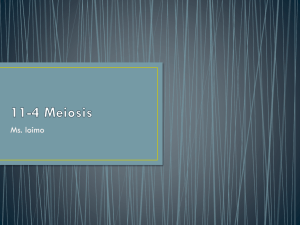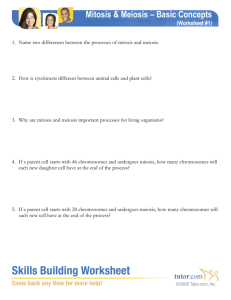Meiosis Powerpoint
advertisement
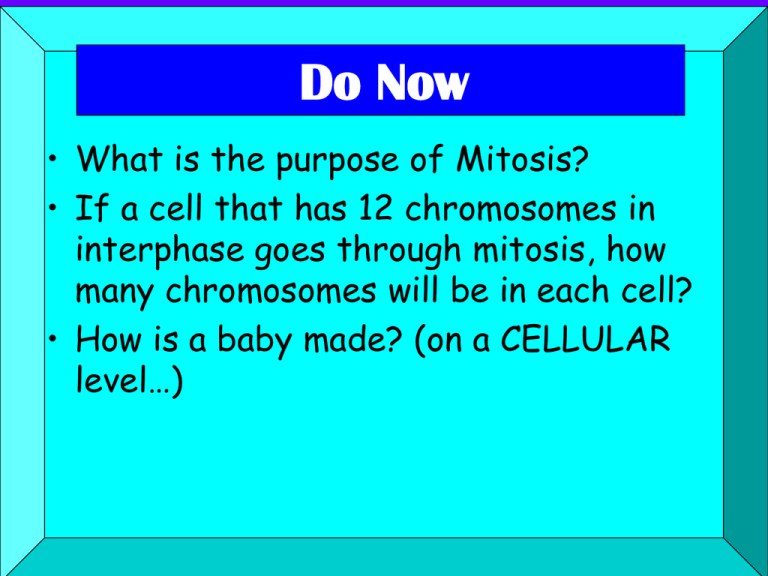
Do Now • What is the purpose of Mitosis? • If a cell that has 12 chromosomes in interphase goes through mitosis, how many chromosomes will be in each cell? • How is a baby made? (on a CELLULAR level…) Objectives • To list the steps of Meiosis. • To compare and contrast Meiosis and Mitosis. • To explain why Meiosis is necessary. Meiosis • Purpose: to make sex cells – Gamete: sex cell • Male gamete= sperm • Female gamete= egg (ovum) Lets take a look at our cells • Our somatic cells contain 46 chromosomes – 1 chromosome from Mom, and 1 from Dad. These are called homologous chromosomes. • Each gamete (sex cell) contains only 23 chromosomes! • Why are there are only 23 chromosomes in our sex cells? Do Now Check which box applies to the following statements or terms. Gamete Cell Somatic Cell 1. Lung Cell 2. Liver Cell 3. Sperm Cell 4. Cell with 23 chromosomes 5. Cell with 46 chromosomes 6. Egg Cell Do Now – Period 3 • What is the sex of this patient? • Monosomy, Trisomy? • Is this individual normal? Objectives • To create a karyotype. • To determine if your client has down syndrome, or another genetic disorder. • To list the steps of meiosis. • To explain the role of meiosis in life. Homologous Chromosomes • 23 pairs of _____________ chromosomes – homologous: 1 from mom and 1 from dad, both contain the same _________________. • Mitosis creates cells that are ____________ (2n) –_____________ = _____of each chromosome Homologous Chromosomes –Meiosis creates gametes that contain ______ chromosomes • Gametes are _____________ –____________= only contain 1 of each chromosome. Diploid vs. Haploid • Diploid cell – Any cell with 2 homologous chromosomes – Abbreviated as 2n • Haploid cell – Any cell with a single chromosome set – Abbreviated as n Do Now Check which box applies to the following statements or terms. Haploid 1.Human Blood Cell 2. Somatic Cell 3. Sperm Cell 4. Cell with 23 chromosomes 5. Cell with 46 chromosomes 6. Gamete Diploid Objectives • 1. SWBAT discuss the stages of meiosis 2. SWBAT draw and label the stages of meiosis • 3. SWBAT will compare and contrast mitosis and meiosis How do we become a Diploid Zygote? • Haploid egg cell fuses with haploid sperm cell in a process called Fertilization. • Half from mom and half from dad make up our homologous chromosomes! (23 pairs) • Our cells then undergo mitosis to create us. • But how did our parents create the sex cells to produce us? Meiosis • Meiosis I and Meiosis II • Each are similar to mitosis • Produces 4 daughter cells • Phases are still IPMAT, however there are two of each of the PMAT phases. Prophase I • Pairing of homologous chromosomes occurs forming a tetrad. (synapsis) • Nuclear envelope breaks down. • Crossing over can occurhomologous chromosomes exchange genetic material. Metaphase I • Chromosome centromeres attach to spindle fibers • Homologous chromosomes line up at the equator. Anaphase I • Homologous chromosomes separate and move to opposite poles Telophase I • The spindles break down. • Chromosomes uncoil and form two nuclei. • The cell divides. Prophase II • A second set of phases begins as the spindle apparatus forms and the chromosomes condense. Metaphase II • A haploid number of chromosomes line up at the equator • Sister chromatids line up Anaphase II • The sister chromatids are pulled apart at the centromere by spindle fibers • Move toward the opposite poles of the cell. Telophase II • The chromosomes reach the poles, and the nuclear membrane and nuclei reform. Cytokinesis Cytokinesis results in four haploid cells Each with n number of chromosomes. http://highered.mcgra whill.com/sites/007249 5855/student_view0/c hapter3/animation__h ow_meiosis_works.ht ml
